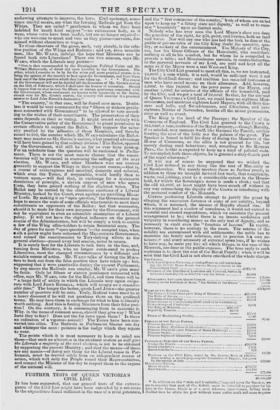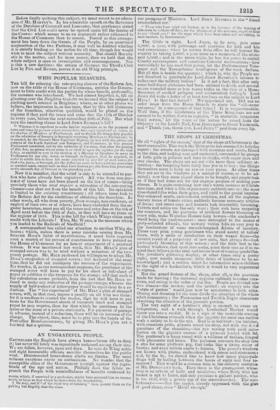FURTHER TESTS OF QUEEN VICTORIA'S CIVIL LIST. IT has been
sugeested, that our general tests of the extrava- gance of the Civil List might have been extended by a reference to the expenditure found sufficient in the case of a rival potentate,
and the " first commoner of the country," b5th of whom are called upon to keep up " a fitting state and dignity," as well as to exer- cise " hospitality" upon no limited scale. Nobody who has ever seen the Lord Mayor's show can deny the grandeur of the sight, for gilt, paint, and liveries, both on land and water. Nor will any one who has had the luck to dine at the public or private table of the City King doubt the quantity, qua- lity, or cookery of the entertainment. The Majesty of the City, too, has his Great Officers of the Household, who contribute nothing at all to his comfort, but for whom he is compelled to provide a table; and Mansionhouse menials, in contradistinction to the personal servants of my Lord, are paid and kept all the same as if the Mayor were a real West-end King.
The City Civil List granted to meet all this, is, we are instructed, 10,000/. ; a sum which, it is said, would be sufficient were it not for the Guildhall dinner; and tradition has recorded instances of men who have saved 'money on their allowance. Add, however, 5,0001. to this 10,0001. for the privy purse of the Mayor, and another 5,000/. for salaries of the officers of the household, paid by the City, and we get a total of 20,000/. So that, for the amount of Queen Vie:Tom:Cs Civil List, we could keep up eighteen Man- sionhouses, and maintain eighteen Lord Mayors, with all their din- ners and balls, and Sword-bearers, and Chaplains, and have eighteen Ninths of November, besides all the minor processions, river as well as street.
The King is the head of the Peerage; the Speaker of the Commons of England. The Civil List granted to the Crown is 385,(1001.a year, exclusive of the Royal property,—though Royalty, if so minded, may immure itself, like GEORGE the Fourth, neither feasting the eyes of the little nor the palates of the great. The Speaker is bound to fulfil his duty of dining the Members of the House of Commons, as the office is not granted for life, but merely during good behaviour; and, according to Sir ROBERT PEEL, the helder is expected to keep up a kind of palatial state. To accomplish both these objects, he is granted a sixty-fourth part of the regal allowance.*
It will not of course be supposed that we wished the Civil List reduced to any thing like the cost of Mayoralty or of Speakership. We merely mention these as further proofs, in addition to those we brought forward last week, that complexity, waste, and jobbing, exist to a considerable extent in the House- hold, for which the Sovereign's name is made a cloak ; and that the odd 85,000/. at least might have been struck off without in any way retrenching the dignity of the Crown or interfering with the personal comfort of the Monarch.
Certain professing Liberals attempt to justify the grant by alleging the enormous fortunes of some of our nobility, beyond which, it is assumed, the income of Royalty should rise. If this argument had a shadow of soundness, it would not extend to wasteful and absurd expenditure, which we maintain the present arrangement to be ; whilst there is an innate sordidness and vulgarity in considering money as the only test of dignity, and as necessary to exalt even the "fountain of honour:' In reality, however, there is no analogy in the cases. The estates of the nobility are encumbered with old settlements; the noble has to maintain his family and relations, and to pension his own re-
tainers el. and every accessory of external splen lour, if he wishes to have any, he must pay for; all which things, in the case of the Monarch, are done at the public expense. The true reply to such sophisms is to show the cost of the Royal Family ; when it will be seen that the Civil List is not above one-third of the whole charge.
Time Caowx,
Civii List of Queen Vie•rontA, excluding Pensions, and not reckon. log the 10,0i.)0/. flume S..cret Service Motley, removed to the Consul Mated Foul £385,100 Revenues of the Dutchies of Lancaster and Cornwall, variously
estimated trout 50,0)91. to 109.0001.—day the lowest 50,000
V35,000
Allowance to A nET.Arns, Queen Consort 1no.000
Annuity to the Dutchess of Kent, " the Mother of the Queen"
30,000
£565,000
MALES OF THE ROYAL FAMILY,
The Iluke of Cumbetlund (new King of Hammel)
£01,000
The Doke of Stnses 21,00
The Duke of Cambridge 21,010
Prince George of Cumbeclautt, 6,0001. (said to be withdraw u).
Prince George of Cambridge . 6,000
The King of Belgium X50,009 Repoli' by Trustees. . 34)0
16,000
Prince of Mecklenburg Strelitz 1,546
FEMALES OF THE ROYAL FAMILY,
Priuyess Augu•da 13,000
l'Iluec.ss Mary (Dutchess of Clutteester)
13,090
Princess Elizabeth (now Priucess of Ilesse Homburg) Princess Sophia 13,000 13,000
l'riucess Sophia of Gloucester 7,000
59,000
gl0,072
PENSIONS TO SERVANTS OF Tile ROYAL FAMILY,
George the Third's
Queen Charlotte's 7,833
Queen Carolina's
803
19,735 Horse Guards Foot Guards •••• 192,103 by the returns at ugly 1101:smtotm Tut ors,
Pensions nn the Civil Lists, stated by !dr. SPRTNO RICE at 150,0001. when making a speech proposing the Committee of Inquiry, but given 133,68t,
277$6O £1,141,129
• In addition to this " state and hospitality," impted upon the Speaker, we are to coredder that part of this 6,000i. must he intended as payment for his duty in the house, which is of a most irksome, monotomaus, killing kiwi. Neither dues he attain his post without sonic native mark and some acquire- Before finally quitting this subject, we must revert to an admis- sion of Mr. HARVEY'S. In his admirable speech on the Revenues of the Dutchies of Cornwall and Lancaster, that gentleman stated that the Civil List could never be opened again till the demise of the Crown : which seems to us an argument rather addressed to the House of Commons than to reason. Forced as this arrange- ment has been down the throats of the People, by an unnatural conjunction of the two Factions, it may well be doubted whether it is strictly binding on the nation for all time, though few would wish to moot the subject without necessity. But should Royalty stir in the matter, and for more money, then we hold that the whole subject is open to investigation and rearrangement. Nor is this a new doctrine: the reform of GEORGE the Third's Civil List by Fox and BURKE, proves it an old Whig principle.



























 Previous page
Previous page